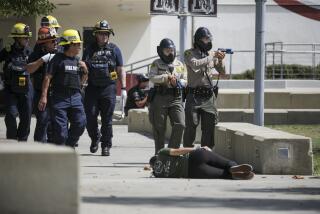Respecting Guns’ Power
- Share via
With notable fringe exceptions, the more one values firearms the more one respects their lethal power and the need to use them properly. That understanding even inspired a slogan: “Guns don’t kill people; people do.”
That said, what reasonable argument is there against a law that addresses what might be termed “the people factor”? Requiring prospective gun buyers to prove they know how to safely handle a firearm would put responsibility, literally, in their hands.
State Sen. Jack Scott, whose son died in 1993 when the shotgun a friend was showing off discharged, thinks California’s existing safety training requirements are wholly inadequate. We agree.
True, handgun buyers must obtain a state firearms certificate. But to get one they need only pass a written test on gun safety or watch a video. Either/or. Handgun buyers are not required to demonstrate any skill in actually handling the weapon. At present, there’s no way of knowing whether they really know how to load and unload the weapon or even store it safely. Since most gun buyers find it convenient to take the existing test or watch the video at the store where they’ve made their purchase, the dealer has a strong incentive to see buyers through the legal steps that let them complete the sale--but little incentive to stop someone who fails the written test or sleeps through the video.
Scott’s bill, SB 52, and a similar measure that passed the Assembly last week, would change that. Prospective handgun buyers would need a handgun safety license. To get that license, buyers would need proof that they had successfully completed a state-certified gun-handling demonstration, along with a tougher written test on safety rules and current gun laws. The state Department of Justice would design both tests, and while prospective buyers could still take them at a dealer’s shop, Scott’s bill would also fund undercover operations to ensure compliance.
The day before Kevin Shelley’s (D-San Francisco) Assembly bill passed, Scott’s bill cleared the Senate. So it seems reasonable to hope that one of the two bills will make it to the governor’s desk. Both are prudent, modest steps that could prevent gun accidents. Even Gov. Gray Davis, gunshy after the firearms lobby vilified him for signing measures requiring trigger locks and limits on gun sales in 1999, has signaled he just might sign one of these measures if they make it to him.
He should. It’s scary that current law permits Californians who may not have a clue about safely handling a handgun to buy one. Even scarier is the thought that lawmakers would want to keep it that way.


